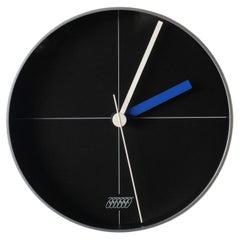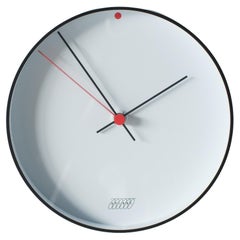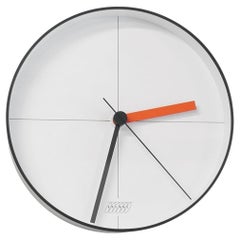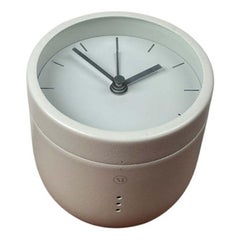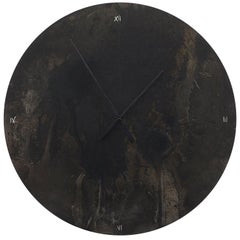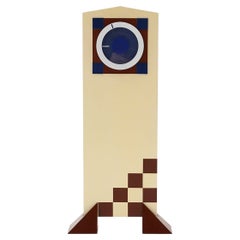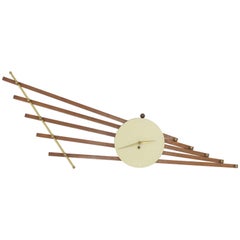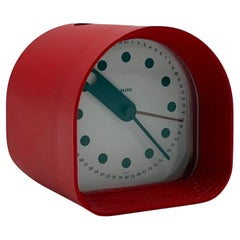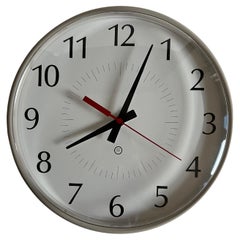Minimalist Clocks
A revival in the popularity of authentic Minimalist furniture is rooted in history while reflecting the needs and tastes of the 21st century. Designer Ludwig Mies van der Rohe’s aphorism that “less is more” influenced the evolution of 20th-century interiors with an emphasis on function and order. This was a shift from the 19th century, with its lavish Victorian decorating, and was spread around the world through design styles including Bauhaus and brutalism.
Yet Minimalism was present in furniture design long before the clean lines of modernism, such as in the simple and elegant utility of Shaker furniture. Although the Minimalist art movement of the 1960s and ’70s had little crossover with furniture design, artist Donald Judd was inspired by the Shakers in creating his own spare daybeds and tables from sturdy wood. (Judd, whose advocacy of symmetry also informed his architectural projects, furnished his Manhattan loft with unassuming but poetic works by iconic modernist designers such as Gerrit Rietveld and Alvar Aalto.)
Understatement rather than ornamentation and open space instead of clutter are central themes for a Minimalist living room and bedroom. As opposed to Maximalism, the focus for Minimalist furniture and decor is on simplicity and considering the design and purpose of every object.
Furnishings are usually made in neutral or monochrome colors and pared down to their essentials — think nesting coffee tables, sectional sofas and accent pieces such as ottomans. And Minimalist ceramics can help achieve a decor that is both timeless and of the moment. The organic textures and personalization of handmade craftsmanship associated with these works have served as a sort of anti-Internet to screen-weary decorators. That said, while the thoughtful ergonomics of Scandinavian modern furniture, with its handcrafted teak frames, are at home in Minimalist spaces, so are the quietly striking pieces by Japanese designer Naoto Fukasawa that employ industrial materials like stainless steel, aluminum and plastic.
Minimalist furniture is not for making flashy statements; it boasts subdued appeal and excels at harmonizing with any room. And, as it encompasses many different movements and eras of design, it also never goes out of style, owing to its tasteful refinement.
Find a collection of Minimalist tables, seating, lighting and more furniture on 1stDibs.
1980s Japanese Vintage Minimalist Clocks
Steel
1980s Japanese Vintage Minimalist Clocks
Steel
1980s Japanese Vintage Minimalist Clocks
Steel
20th Century German Minimalist Clocks
Metal
21st Century and Contemporary American Minimalist Clocks
Aluminum, Steel
21st Century and Contemporary American Minimalist Clocks
Aluminum
1980s North American Vintage Minimalist Clocks
Aluminum
20th Century French Minimalist Clocks
Brass
1970s Swiss Vintage Minimalist Clocks
Brass
1930s Czech Vintage Minimalist Clocks
Steel
Late 19th Century American Antique Minimalist Clocks
Wood
1970s German Vintage Minimalist Clocks
Plastic
20th Century Italian Minimalist Clocks
Plastic
Early 20th Century French Minimalist Clocks
Glass, Wood
Early 20th Century Japanese Minimalist Clocks
Glass, Wood
1920s Japanese Vintage Minimalist Clocks
Iron
1950s Vintage Minimalist Clocks
Brass
Mid-20th Century European Minimalist Clocks
Bakelite, Glass
1980s Italian Vintage Minimalist Clocks
Plastic
1990s Minimalist Clocks
Metal
1980s Japanese Vintage Minimalist Clocks
Steel
1980s Japanese Vintage Minimalist Clocks
Acrylic
1980s Japanese Vintage Minimalist Clocks
Acrylic
21st Century and Contemporary Japanese Minimalist Clocks
Acrylic
21st Century and Contemporary American Minimalist Clocks
Concrete, Aluminum
Mid-20th Century Italian Minimalist Clocks
Art Glass, Blown Glass, Glass, Murano Glass, Sommerso
